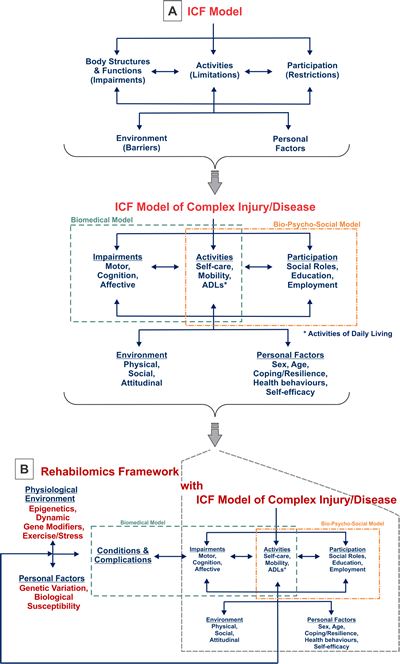Mapping the Rehabilomics® Model to the ICF Framework
 The International Classification of Functioning, Disability, and Health (ICF) is a classification system developed to describe an individual's level of body functioning, activity levels and participation (see Fig A). This model* highlights the relationships between the individual's health condition to factors in his/her environment. It is a dynamic model that focuses on bio-psycho-social function instead of medical condition or disease. Through the ICF model, limitations of function are identified and used to develop an individualized plan of care. The ICF model can be applied in many different cultures amongst men and women over the lifespan.
The International Classification of Functioning, Disability, and Health (ICF) is a classification system developed to describe an individual's level of body functioning, activity levels and participation (see Fig A). This model* highlights the relationships between the individual's health condition to factors in his/her environment. It is a dynamic model that focuses on bio-psycho-social function instead of medical condition or disease. Through the ICF model, limitations of function are identified and used to develop an individualized plan of care. The ICF model can be applied in many different cultures amongst men and women over the lifespan.
The Rehabilomics® Framework (Fig B) connects biological indicators to the WHO-ICF Model and provides a contextualized approach to biomarker research where bio-psycho-social aspects of recovery and care are used to generate a personalized approach toward the rehabilitation process. Multiple types of biomarkers, including genomic, epigenetic, protein, steroid and other markers have been examined for their associations with outcome and susceptibility to complications after traumatic brain injury (TBI).
for further discussion of how the ICF model applies to brain injury see: http://www.ncbi.nlm.nih.gov/pubmed/14530589
*This model was developed using the World Health Organization (WHO) International Classification of
Download a pdf of this page here.

